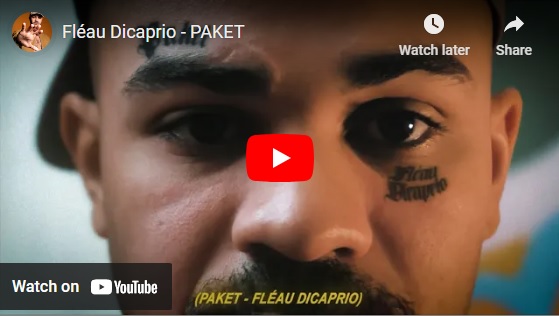“Rap is a vicious world. You don’t have a choice: if you want to be seen as a relevant player in the scene, you need to come with a dog-eat-dog philosophy,” says the Montréal rapper, philosophizing about the title of his album — the literal translation of the expression evoking the selfish, animalistic nature of humans competing. “But I’m not making that statement as if I was announcing that I’ll crush everyone in my way… It’s just my way of saying I’m here, and I’ll take my rightful place in the game.”
 A mere two months after releasing said first album, one can safely say Fléau Dicaprio has, indeed, taken his rightful place. And to be clear, he didn’t just do so in the best artist name category: the rap-oriented press in Québec is constantly praising him, while his tracks have garnered hundreds of thousands of streams. Some of the most respected players on the local hip-hop scene – Mike Shabb, Baxter Dexter, Ruffsound – have signalled their interest in collaborating with the up-and-comer in the wake of his album.
A mere two months after releasing said first album, one can safely say Fléau Dicaprio has, indeed, taken his rightful place. And to be clear, he didn’t just do so in the best artist name category: the rap-oriented press in Québec is constantly praising him, while his tracks have garnered hundreds of thousands of streams. Some of the most respected players on the local hip-hop scene – Mike Shabb, Baxter Dexter, Ruffsound – have signalled their interest in collaborating with the up-and-comer in the wake of his album.
Active in rap Québ since the late 2010s, under the moniker Le Réel Fléau, he started turning heads thanks to his offbeat attitude (reminiscent of Jeune Loup, among others), his razor-sharp flow, his carefully crafted rhyme structures, his raw language, and his innovative musical direction – one that includes trap, and hard-rock guitar riffs.
That musical direction is masterminded by Danny Ill, the seasoned Montréal producer who’s worked with Tronel (of Anticipateurs fame) and, most notably, with Mike Shabb, on one of the masterpieces of Québec rap, 2020’s Life Is Short. It’s actually because of Danny Ill that Dicaprio took rap more seriously, after years of just dabbling for fun.
“We knew each other before that, but at some point during COVID, we decided to do a session,” he says. “We spent the whole day doing rap and recorded seven tracks, including “Chien mangé chien.” On that day, rap became serious for me. I had to take advantage of the vibe; everything was falling in its proper place.”
Including his persona. Born in Montréal’s Mile-End, Dicaprio doesn’t have your typical rapper’s stature. As a matter of fact, he says he tries to blend in with the evolution of the neighbourhood, where he’s lived for more than 25 years now. “Mile-End is a neighbourhood where life is good,” he says. “It’s relaxed and arts-oriented, but before it was as popular a neighbourhood as it is now, it was more of an industrial area, which is often the case with neighbourhoods built around train tracks. A house cost next to nothing when my mom had me. It wasn’t a ghetto, but it was very modest, like Saint-Henri, Pointe-Saint-Charles, or even Hochelaga.”
Born in a middle-class family to a Québécoise mother and a father from Ghana, Dicaprio’s teenage years were full of turmoil, and he frequently changed schools. “I experienced a lot of fucked-up shit. I don’t have anything to prove to anyone,” he says, without going into the finer details. “Now, with my music, I just want to have fun and laugh. I rap about street shit, but with a bit of humour.”
Except, to be honest, what Dicaprio offers is far from just funny. It’s raw, incisive, provocative, sometimes unflattering – even shocking – towards women. His writing is very… explicit. It’s not hard at all to picture what he’s describing. “Of course what I do is intense, but we’re making rap, man, not children’s songs,” he argues. “I’ve done a lot of podcasts and interviews, so people are getting to know me, little by little. They have an opportunity to see for themselves that I’m not some kind of idiot, or moron, and that I’m in my right mind. All that balances out the rawer stuff I put out in my music.”
As a matter of fact, anything raw that he plans to put out is carefully combed through by Dicaprio’s entourage before it’s released. “When I play my songs to my close friends – girls or boys – no one is in ‘yes man’ mode. Some of them think I go too far in some places, but overall, my songs are well-received. Plus, let’s be honest: if my shit was that fucked up, I wouldn’t get as much attention from the media…”
One thing for sure, Dicaprio skillfully navigates between the first and second degree in his lyrics, and he exaggerates the tropes and clichés of American rap with an approach that’s just offbeat enough that we instinctively know he’s not 100% serious. “It’s just music, at the end of the day,” he says. “What we say is true, but we exaggerate some things to make you react, to make it funnier… I don’t put on a costume when I step into the recording booth. It’s 100% Fléau, but I pump myself up with a different energy.”
And it’s a brand new energy he wants to offer us next. Dicaprio is working on his second album, but says he’s in no rush to finish it, because he wants to develop a new artistic direction from what we hear on Chien mangé chien. “I introduced myself as Fléau, people heard my bars and they know I can be raw,” he says. “I proved I’m able to say crazy shit, but it’s time to reach out to a new clientele; namely, the people who think I’m too much.”
